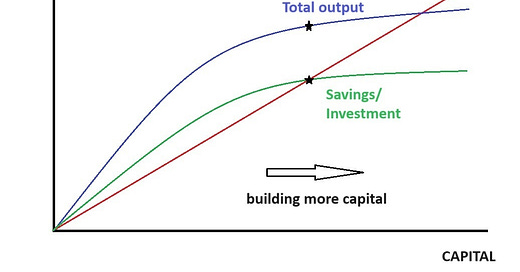I do believe that the average level of intelligence varies between nations, and that that is a very important factor in determining the level of income between countries. It may seem surprising, then, that I favor a vastly increased level of immigration to the United States. There is no contradiction, however. Immigration will have positive and negative effects, but recognizing the negative effects without also considering that the positive effects are far larger is an error.
I believe that the achievements of the unusually smart have a vastly disproportionate effect on economic growth, so long as they are in institutions where they can be free to work and create. More people is better, even if their average is lower, because the genius drags along many, many poor people to prosperity. As such, we should be less picky in allowing or not allowing immigrants. It is quite alright to admit many, many dullards – one productive genius carries along thousands.
This all follows from two facts: knowledge is an externality, and smart people are not perfectly substitutable factors of production. In fact, gains in knowledge are the whole reason why growth occurs. Let’s consider the Solow model.
The model assumes declining returns to saving more. Imagine everyone is a farmer. Adding the first tractor has the biggest impact, and by the time you’re up to several tractors per person, the returns have certainly declined, if not turned negative. In addition, the amount which you can save is bounded by depreciation – all this capital must be taken care of, or else it is lost. As such, given a certain level of technology, there is a maximum level of consumption which can be sustained. To have economic growth requires that the level of technology change.
The problem is doubled by the fact that knowledge does not have many of the properties which make markets optimal. It is not divisible, and its access cannot be restricted. Arrow 1962 is an excellent resource to read here. We should expect that, left to their own devices, firms will invest in a socially sub-optimal level of research and development. A patent is an attempt to capture some of the benefits of innovation, but it creates inefficiencies of its own (a monopoly selling at a constant price maximizes profit by restricting quantity produced), and is insufficient. Nordhaus 2004 measured the percentage of social gains captured by the inventor, and arrived at minuscule figures – perhaps 4%. Gains in technology are often something of a byproduct of productive work by very smart people.
This is not to say that the less cognitively advanced do not matter. By doing more menial tasks, it frees up geniuses to work on the things that most benefit society. Somebody needs to implement the plans. An architect’s plan for a building is worthless without labor to raise up beams and lay concrete. But the important thing is that the architect’s work is less substitutable for than the laborer’s. Grant that every architect is weak and geeky. With enough architects on a rope, anything can be moved or assembled. The reverse is not true. How many construction workers would be needed before a blueprint of a complex structure is drawn up? I would venture that it is no finite number — it would simply be impossible. Or another example — Albert Einstein could substitute one to one with a patent clerk. How many patent clerks would it take to substitute for Einstein? Not a thousand; not a million. Tacit knowledge such that the scientist has lodged in their brain cannot be meaningfully shared, and the task cannot be divided at any price.
Think of it like this. The cell phone was developed entirely in the developed world, primarily in America, Japan, and Europe. Yet, it benefits the entire world, not just those places which developed it. Right now, it is responsible for 9.1% of Africa’s GDP. It is highly implausible that Africa would have developed it on its own. In point of fact, if sub-Saharan Africa did not exist it would have a trivial impact on the developed world. It exports 17 billion a year to the United States – since those exports are balanced by corresponding imports, the gains from efficiency are quite low. The converse is not true. If the developed world did not exist economic growth in sub-Saharan Africa would grind to a halt. The advances in medicine which have made Africa habitable to a large population would not happen – the Green Revolution, would not have happened – computing – efficient oil extraction – and on and on.




“so long as they are in institutions where they can be free to work and create.” How would low Iq migrants not undermine this? Read Garrett Jones